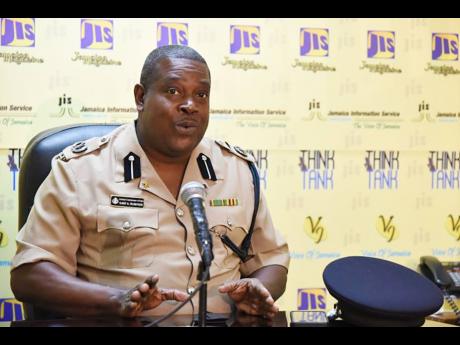ACP McKenzie: Embrace lawfulness, not corruption
WESTERN BUREAU:
HEAD OF the Public Safety and Traffic Enforcement Branch (PSTEB) of the Jamaica Constabulary Force (JCF), Assistant Commissioner of Police (ACP) Gary McKenzie, has pushed back at suggestions that the fines in the new traffic act would engender increased police corruption.
“Law enforcement does not tolerate any form of corruption, whether it is traffic or any other offence that is committed,” ACP McKenzie said yesterday. “The issue of fines and penalties for road traffic breaches will intensify discussion around that, but we must embrace lawfulness and not corruption.
“Such acts of corruption normally involve a taker and a giver, where someone will seek to bribe the police and there are instances where the officer will initiate that illegal activity,” the veteran crime fighter added. “But my advice is that when police make such an approach, it should be recorded, and immediately reported… Equally we have said to our officers that you should desist from this practice.”
Public transport operators are concerned with some of the measures in the newly enforced Road Traffic Act, with some suggesting that the hefty ticket fines could encourage corruption.
The taxi operators are also lamenting the failure of the Government to put the supporting infrastructure in place, claiming that the current transportation centres in the rural townships are inadequate.
“It is heartless for the Government to want to fine me if my car is broken down and I get the assistance to pull it to safety,” said Stanley Hemmings, who plies the Montego Bay to Anchovy route in St James. “Now I must use a wrecker when I can hardly fill my tank?”
However, public transport operators and the different associations do not appear to be unified, as while some have withdrawn their services in protest, it is business as usual for others.
President of the St James Taxi Association, Dion Chance, decried the imposition of the hefty fines but conceded that something had to be done to restore law and order.
“People in the taxi industry and even ordinary motorists prefer to pay money than take a ticket and that is why many now have outstanding tickets,” Chance said. “The Government needs to put things in place or we as citizens need to position ourselves where the police are afraid to demand payment because he knows that the chance of him being reported is 99 per cent.”
Chance believes taxi operators are front and centre of the dispute because they are always in the public space, not that they are being targeted.
“What I like is that the minute the ticket is issued to you, it is in the system at every collectorate and police station, so if I pay my fine as soon as possible, it will be erased immediately and that is a step in the right direction,” the experienced public transport operator said. “Because no longer will people pay their ticket and it comes back to haunt them.”
“If you talk about the amount, even though I think some are exorbitant, but sometimes you have to have a deterrent.”
According to ACP McKenzie, the aim of the new laws is to reduce fatalities, poor driving behaviour, and to ensure that all citizens are safe.
And where an attempt is made to bribe or accept payment, it should be immediately reported for an operation to be set up, to arrest and place the individual before the courts, the traffic chief said.
“We will not be able to achieve this objective if we allow things such as corruption to get in the way,” said McKenzie.

